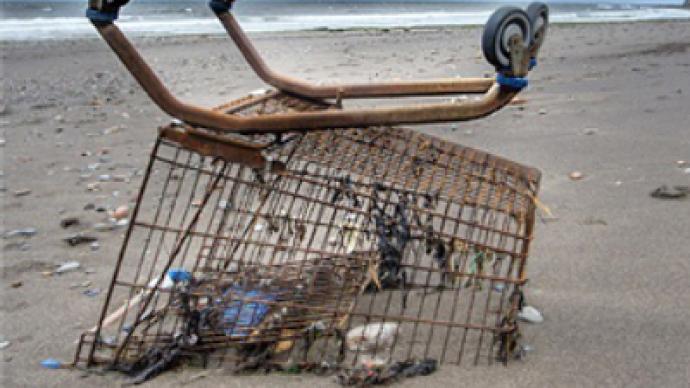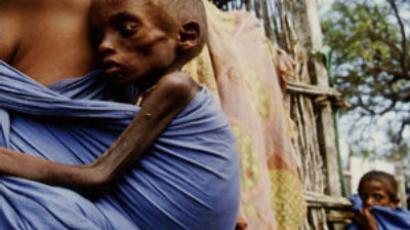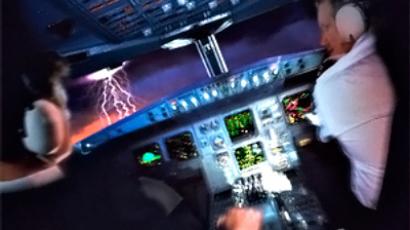Is it time to give Capitalism a vacation?

Oil spills, global warming, species extinction and foreign wars in oil-producing countries all in the name of short-lived consumerism. How much more can the natural world handle?
“Capitalism creates a rational frame of mind which, having destroyed the moral authority of so many other institutions, in the end turns against its own.”
– Joseph A. Schumpeter
For the past 400 years, man has been waging a relentless battle against nature in order to gain mastery over her physical resources and natural laws. This campaign, we enthusiastically believed, would ultimately improve the condition of man. But in the days when scientific discovery was in its infancy, few could see – due to the seeming vastness and indestructibility of the natural world – that “conquering nature” in order to improve our earthly existence is the most glaring contradiction.
After all, how is it possible to pillage nature on the one hand, while creating an earthly paradise on the other? As the disastrous oil spill in the Gulf of Mexico clearly demonstrates, it is only possible to “conquer nature” in the most negative interpretation of the phrase.
As William Ophuls wrote in his book 'Requiem for Modern Politics,' “nature cannot support such inflated demands: the myth of cornucopian abundance is false, and the penalty for transgressing ecological limits is self-destruction.”
Yet we stubbornly, childishly cling to the belief that the planet – a finite system – can forever play the role of both Garden of Eden and junkyard.
Pie in the sky, astronauts on earth
Today, most people are forced to live like astronauts stuck in outer space. Think about it: due to our urbanized, consumer lifestyles, we have become completely severed from the earth, while the critical supplies that we need for our survival – food, water and in some cases even our air – is collected and plastic-wrapped for consumption courtesy of the corporations.
Then, without so much as a second thought, we throw away all this accumulated rubbish – bottles, plastic bags, food scraps, cigarettes, household cleaners, wrappers, newspaper, cars, clothes, computers, shoes, furniture, televisions etcetera, etcetera, ad infinitum, ad nauseam straight into the trash bin. This we call “cleaning house,” without taking the time to consider that the ultimate house – the earth – is getting more and more ravaged by the minute.
The great dilemma is that all this assorted trash no longer naturally decomposes in the soil – as biodegradable human waste did for many millennia – but rather morphs into monstrous mountains of stinking refuse on the edge of metropolis – and beyond.
The scientific community recently planted a sad flag on the so-called “Great Pacific Garbage Patch,” which is a junkyard roughly the size of the state of Texas circulating in the middle of the Pacific Ocean. This floating, stinking, retching monument to our madness is comprised of plastics, chemical sludge and an assortment of other dangerous wastes. Poetical and sentimental arguments for garbage-free sunsets aside, there are myriad known and unknown scientific problems associated with high concentrations of plastics churning about in the ocean. Due to time and space limitations, we can mention one.
Sloshing around day after day amidst the salty waves and blazing sunlight, this millions of pounds of plastic is breaking down into polymers through a process known as photodegradation. This process pulverizes the plastic all the way down to the molecular level. Unsurprisingly, these toxic particles are entering the food chain through the aquatic animals that are unwittingly consuming them. So the next time you hear reports of bisphenol A, PCBs and polystyrene suddenly popping up in breast milk, the reason will be more understandable.
We have yet to come to terms with the uncomfortable fact that every single thing we produce, every single thing we buy, will eventually get old, break down, and get “tossed out” in the trash (One recent consumer study estimated that about 90% percent of our modern household purchases get thrown away in the first 10 days after they are bought). Indeed, many products today are not “built to last,” thus fueling the consumer economy and corporate profits. Moreover, capitalism oftentimes thrives best in moments of disaster and crisis.
Bad for us, good for Capitalism
In her book 'The Shock Doctrine,' investigative journalist Naomi Klein examines the economic theory of the late economist Milton Friedman, who welcomed crises as chance opportunities for capitalism to gain a foothold where before there was none.
Klein quotes Friedman as saying that “only a crisis – actual or perceived – produces real change. When that crisis occurs, the actions that are taken depend on the ideas that are lying around. That, I believe, is our basic function: to develop alternatives to existing policies, to keep them alive and available until the politically impossible becomes politically inevitable.”
In other words, catastrophes and crises, according to Friedman and his ilk, are golden opportunities for imposing ideas that would otherwise be rejected under normal conditions.
“Some people stockpile canned goods and water in preparation for major disasters,” Klein writes. “Friedmanites stockpile free-market ideas. And once a crisis has struck…it was crucial to act swiftly, to impose rapid and irreversible change before the crisis-racked society slipped back into the ‘tyranny of the status quo’.”
In some ways, the history of the ongoing financial crisis, which saw once-powerful global corporations and financial institutions brought to their knees by their own corruption and greed, incorporates many of Friedman’s arguments. For all of its compromised principles, the business community, once again, has largely escaped punishment for its craven practices. In fact, it was actually rewarded for creating the global crisis in the form of a $7 trillion bailout courtesy of the US taxpayer.
This leads to the question: should the business community be “personally responsible” for regulating themselves when it comes to protecting the environment? The answer here is: no way.
It is no secret that Big Business employs a small army of smooth-talking lobbyists who are practically camped-out in Congress to protect corporate profits from the “communists” who would dare impose environmental borders on their global activities. And woe to the CEO who places environmental considerations ahead of shareholder revenue.
The financial crisis should be a powerful wake-up call for any person who believes that corporations will always “do the right thing” when it comes to protecting the environment. After all, if Capitalism and the invisible hand of the market cannot protect itself from the consequences of corporate misbehavior, how can we really expect it to understand what it is doing to the environment? In other words, it doesn’t even understand its own inherent laws and flaws, so how can it understand the laws of the natural world. It can’t.
Meanwhile, with the Eco-Armegeddon clock ticking, the “environmental issue” regularly gets a cynical shrug-off from the world of business only because the environment has not yet experienced a devastating catastrophe. The Earth still has a pulse so all the doom-saying Cassandras can be safely ignored. Yet the current global economic crisis will pale in comparison to any global environmental crisis. It is practically child's play to “save” a failed economic system by pumping trillions of dollars into the economic hole; but Mother Nature will not be bought-off when the environmental scales finally tip in our disfavor. At that point, we will be completely at her mercy.
What is to be done?
The ultimate paradox of our present dilemma is that as we come to understand the inner workings of the natural world better than ever before, this accumulated knowledge is not preventing us from destroying the natural world at an alarming rate. It is as if all of our scientific gadgets and know-how are only really good at gauging the level of destruction, as opposed to actually fixing the damage.
And despite all the talk about “saving the planet” – as if man were God himself – we have not moved beyond mere pretenses. Meanwhile, the statistics of a dying planet, and all of the species it contains, continue to be calculated with cool, detached efficiency.
In February, for example, the World Wildlife Fund warned that tigers could become extinct in the wild (that is, outside of the zoo population) in less than a generation as it launched an international campaign to save the animals.
The number of wild tigers has dwindled to 3,200 – less than the number now in captivity in the United States alone, the campaigners said.
“There is a real threat of losing this magnificent animal forever in our lifetime,” said Sybille Klenzendorf, director of the WWF species conservation program. “This would be like losing the stars in the sky.”
“Three tiger subspecies have gone extinct, and another, the South China tiger, has not been seen in the wild in 25 years,” she told reporters.
And although certainly not as proud and popular a species as the tiger, could we really imagine a world without frogs and amphibians, which help to balance the ecosystem in myriad ways we don’t remotely understand? Incredibly, we are quickly approaching that precipice.
“As many as one third of the nearly 6,000 known amphibian species – frogs, toads, salamanders, even wormlike caecilians – are threatened with extinction, according to the International Union for Conservation of Nature (IUCN),” the Scientific American reported in late 2008. The culprit? Yes, the most inventive, intelligent, intriguing creature on the planet: we 7 billion-plus Homo sapiens (ironically, this term means "wise man" in Latin).
But here is the real kicker. Frogs and amphibians serve as the “canary in the coalmine” for the rest of the planet.
“The really bad news,” the article continues, “is that amphibians may be just the first sign of other species in trouble. Biologists at the University of California, San Diego, have shown that amphibians are the first to respond to environmental changes, thanks to their sensitivity to both air and water. What goes for amphibians may soon be true of other classes of animal, including mammals."
Now if that is not a wake-up call to change our destructive ways, I don’t know what is.
But perhaps there is another reason that prevents the human race from embracing the natural world once again: Fear. Fear of the power that nature has over all of us.
“Alone in the silence, I understand for a moment the dread which many feel in the presence of primeval desert, the unconscious fear which compels them to tame, alter or destroy what they cannot understand, to reduce the wild and prehuman to human dimensions,” wrote Edward Abbey in the novel 'Desert Solitaire,' a documentation of a season in the wilderness. “Anything rather than confront directly the antehuman, that other world which frightens not through danger or hostility but in something far worse – its implacable indifference.”
So maybe it’s time to put aside our fear and contemplate exactly what it is that makes us cut down the very branch that is supporting every life form on the planet. And then when we understand that primitive fear, perhaps then we can give capitalism a short vacation (one year, five years, a hundred even? And for those skeptics who would bravely argue that Capitalism never sleeps, consider this: Economists have figured that in the last decade we gained NOTHING thanks to the recent crisis; in other words, all of our work and energy figured in Capitalism's big account book as a big, fat, ugly Zero. Yet the damage that we have inflicted on the planet in the last year alone is beyond estimation) until we find a way to happily continue with our earthly pursuits in a way that does not disrupt every form of life on the planet.
Otherwise, we are simply enjoying, to paraphrase Edward Abbey, “a fool’s progress.”














